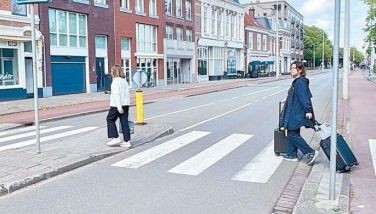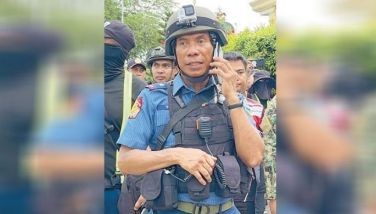Jail mom rights
Not a lot of further thought has been given to Reina Marie Nasino, the pregnant woman who was arrested for illegal possession of firearms and explosives, and the inhumane treatment given to her by our state. Remember her? Reina was thrown into jail, where she gave birth to a sickly child. She asked the court if she could stay in the hospital with her child, or at least, in a prison nursery. Her request was denied.
River Emmanuelle was torn from Reina’s embrace, to be cared for by relatives. Unfortunately, River caught pneumonia, and Nasino asked permission for a hospital visit. Before the court could grant the request, River died. As if to put more salt in her wounds, when Nasino was allowed to visit for River’s wake as well as his burial, she was handcuffed. She was not allowed to embrace River’s coffin in the end. Or even wipe her tears.
Last week, after spending more than three years in jail, Nasino was acquitted. The new judge presiding over the trial found reasonable doubt as to her guilt. And so Nasino is a free woman, albeit childless.
What next in this sordid tale? Well, let’s not forget the participants in Nasino’s grim life story. There’s one of the judges who handled her case, for example --Judge Marivic Balisi-Umali to whom we should shift the spotlight.
She was the judge who disallowed Reina from breastfeeding her baby, and effectively separated them when River was only a month old. She refused River’s presence in the jail, ruling that there were no facilities to accommodate River. She accused one of the lawyers of attempting to mislead her about whether Nasino was really breastfeeding, or using formula milk. Ultimately, she was asked to inhibit herself from the case, and did.
That’s not the end of her participation, though. In 2020, an administrative case was filed against her before the Supreme Court, accusing her of gross misconduct and gross ignorance of the law. That hasn’t been decided, and fresh attention was given to her own case, considering Nasino’s acquittal.
It’s hard to get information on Balisi-Umali (I mean I can’t be bothered to do more than google). There’s an administrative case she filed against her utility clerk, for mouthing off against her. She also vied for the post of deputy ombudsman for Luzon, but lost. She was the judge handling the hazing case against 10 fratmen, whom she denied bail.
But information on her academic background, scholarly papers, or decisions she may have written, aren’t to be found. Hence, there isn’t much to work on in terms of assessing who she is, and her chances of being found by our Supreme Court to be grossly ignorant of the law.
Legalities aside, it does seem strange for an officer of the court to countenance an outcome that would separate a sickly newborn from his mother. Breastfeeding isn’t a privilege to be conferred. It’s a fact of life.
The basis for the pending case against Balisi-Umali are several international obligations that our country apparently owes due to treaties. In 2010, the Bangkok Rules were adopted by the UN General Assembly, and those prescribed rules for the treatment of women prisoners.
Bangkok Rules dictate that women should have the facilities necessary for their hygiene, especially for those who are pregnant or breastfeeding. Suitable healthcare should be provided to the accompanying child. More importantly, the rules say mothers shouldn’t be discouraged from breastfeeding their children, and adequate food and a healthy environment should be provided to the female prisoner.
Perhaps the Supreme Court will rule that as a judge, Balisi-Umali should have found ways to implement these international obligations. If the prosecutors or the penal facility tell the court they don’t have facilities adequate for mothers and newborns (which they did in Reina’s case), then perhaps the judge should instruct them to find ways to comply with the Bangkok Rules? That might have been a much more desirable alternative.
We await guidance from the Supreme Court. The best outcome might be for prescriptive guidelines for judicial officers in these scenarios. How to use their powers to pro-actively assist pregnant or breastfeeding mothers. Where to house them. What facilities should be provided. Any of a multitude of choices, where the cruelest outcome of mother and child separation is never an option.
- Latest
























